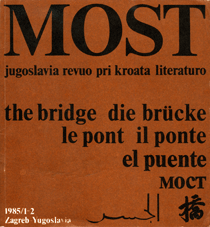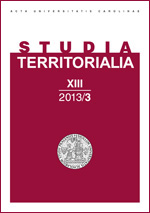


Even though I am still a child, I am taking the liberty of telllng you grown-ups a'bourt myself. You adults surely think: these eleven-year- old kids have nothing more important in their head.sthan the thought of a football. Well now, my classamate Gabre, who sits on ,the same bench with me, has many odd desires and his parents, being well-to do, fulfill his every wish. To tell you the truth, I would like to have my very own football anid kilck it so long anid so hard that I wouldn't even want to see it for a week. What I wouldn't gitve for skils!
More...

The lexicon of contemporary Croatian writers
More...
TA FAÇON DE M'AIMER SÉPARATION TU ES VENU ET TU ES PASSÉ LE CALME N'EST PAS SILENCE LE SOURCE DE LA NUIT LES JUSTES LE SON LE CERISIER LA PLUIE A TON ODEUR O SILENCE ...
More...
THE DEPARTURE OF EURYDICE (1 of 2) THE DEPARTURE OF EURYDICE (2 of 2) LET'S GET THE COACHMAN DRUNK (1 of 2) LET'S GET THE COACHMAN DRUNK (2 of 2) WINDOWS MEMORY OF THE PURPLE COLOR RUSTLE OF WINGS AND WATER WINDOW IN A LOST TOWN FOR ALL THINGS OUR CHILDHOODS ARE TO BLAME THE RIVER IVANYA BALLAD OF THE DECEIVED FLOWERS (1 of 2) BALLAD OF THE DECEIVED FLOWERS (2 of 2) OPEN DOOR (1 of 2) OPEN DOOR (2 of 2) VIRGINITY CAVE WITH A WELL AND FLOWER (1 of 2) CAVE WITH A WELL AND FLOWER (2 of 2) SLEEPING YOUTH YOU WHOSE HANDS ARE MORE INNOCENT (1 of 2) YOU WHOSE HANDS ARE MORE INNOCENT (2 of 2)
More...


Keywords: United States; Colombia; war on drugs; war on terror; illegal armed groups; aerial eradication
The article describes the basic elements of U.S. policy in Colombia during George W. Bush ’ s presidency. It points out several issues for which the U.S. government has been continuously criticized, but focuses on two main aspects of the policy: the two-pronged war against illegal armed groups and the aerial eradication of illicit crops. I argue that although broader U.S. objectives such as strengthening of Colombian democracy have been fulfilled, the aerial eradication has not only proven ineffective in the long run, but is inherently flawed and continues to cause massive ecological destruction.
More...
Keywords: Thailand; United States; Field Marshal Phibunsongkhram; Cold War; anti-communism; SEATO; democracy
This article focuses on the relationship between the United States and Thailand under Field Marshal Phibunsongkhram between the years 1948 and 1957. It first seeks to show how Phibun, who had collaborated with the Japanese during World War II and had at one time faced prosecution as a war criminal, was able to overthrow the post-war liberal government and gain acceptance in the United States. Next, it will present and analyze the basic tenets and principles of the Thai-American relationship in the context of the Cold War and the bipolar rivalry in Asia. Finally, it will explain the issue of Phibun ’ s changing image in the United States and his attempts to make his government more “democratic” as part of his struggle to retain power and to quell the growing internal discontent with his regime.
More...
Keywords: Mari; animals
Review on: Margarita Kuznecova, Nazvanija dikih i domašnih životnyh v marijskom jazyke, Joškar-Ola 2010
More...Keywords: Livonian; Estonian; Latvian; lexicography
Review on: Tiit-Rein Viitso, Līvõkīel-ēstikīel-leţkīel sõnārōntõz. Liivi-eesti-läti sõnaraamat. Lībiešu-igauņu-latviešu vārdnīca. Toimetamine ja läti vasted / Redaktors un latviešu daļas autors Valts Ernštreits, Tartu—Rīga 2012
More...Keywords: Estonian; Võru-Dialect; lexicography
Review on: Inge Käsi, Vanapärase Võru murde sõnaraamat. Toimetanud Helmi Neetar, Tallinn 2011
More...Keywords: Votic; subject; predicate
Review on: Heinike Heinsoo, Mā ja pūd lēväd, meid eb lē. The Subject and the Predicate in Votic, Tallinn 2010 (Linguistica Uralica. Supplementary Series / Volume 4)
More...Keywords: Estonian; phonology; Optimality Theory
Review on: Külli Prillop, Optimaalsusteoreetiline käsitlus eesti keele fonoloogilisest kujunemisest, Tartu 2011 (Dissertationes Philologiae Estonicae Universitatis Tartuensis 28)
More...Keywords: Livonians; language; history; culture
Review on: Liivlased. Ajalugu, keel ja kultuur. Koostanud ja toimetanud Renāte Blumberga, Tapio Mäkeläinen ja Karl Pajusalu, Tallinn 2011
More...
Keywords: statistics; demographic indicators; Diaspora; Bulgarian Uniates; Catholicism; Macedonia; Ottoman Empire; Bulgarian Exarchate; Congregation of the Mission / Vincentians / Lazarists; nationality
After the Berlin Congress (1978), which divides the Bulgarian lands, the biggest amount of Bulgarian Catholics stay within the Ottoman Empire – mostly in Macedonia and less in Edirne Thrace. Using the interdisciplinary methodology, the research studies geographical diffusion, numbers and demographic indexes of Bulgarian Catholics (respectively Uniates) in Macedonia during the period 1879–1912, something that has not been a subject for a specific research up to now. That is why the above mentioned parameters have been examined taking in consideration the following data – the official statistic data of the Ottoman Empire, the data of Bulgarian Exarchate, the catholic data (those of Congregation of the Mission, known as Lazarites etc.), as well as Bulgarian and Greek sources. The study shows the differences in particular national statistics regarding the numbers of Bulgarian Uniates and Greek and Turkish attempts to manipulate the data in order to prove their “true” nationality. Last but not least, the study traces the ebb and flow waves to the Uniats during 19th–20th centuries. As a result it concludes that although the registered outflow from the Union at the end of 19th – beginning of 20th century, on the eve of the Balkan War (1912) there is a stabilizing and certain expansion of Catholicism positions amongst Bulgarians in Macedonia at the end of the 1st decade of 20th century. Both – the data of the Catholic sources, as well as the data of Bulgarian Exarchate for the years 1911–1912 confirm this.
More...
Keywords: Czechs in Bulgaria; Bulgarian-Czechs relationships; economic modernization; Bulgarian brewing; Irzhi Proshek / Jiří Prošek; Bogdan Proshek / Bogdan Prošek
This text is the family chronicle of the Proshek brothers, a Czech family with a prominent role in the development of the Bulgarian economy after 1878. The text has been written by their direct descendant – grandson of Irzhi Proshek. Their family history is presented, as well as their first contacts with the Bulgarians and their further development in liberated Bulgaria. Some of their economic initiatives are described in detail (in the construction area, the infrastructure development, the brewing etc.); their activities in the community are being described. As far as the activities of the Proshek brothers are of importance to the early Bulgarian economic modernization, the text has its value not only as a family history, but also as a source about the economy history of the country.
More...
Keywords: World War II; Great Patriotic War; Slavic countries
A presentation of “Let Me Tell You about the War… World War II and the Great Patriotic War in textbooks and in the minds of the students from the Slavic countries” – a collective monograph, written by eleven Russian authors.
More...